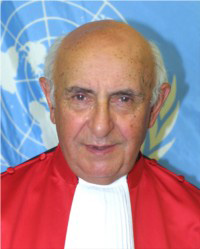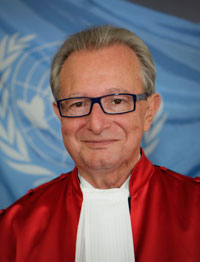| Press Release |
TRIBUNAL
|
| (Exclusively for the use of the media. Not an official document) |
|
The Hague, 19 October 2011
NJ/MOW/1453e
Judge Meron and Judge Agius elected President and Vice-President of the ICTY
 |
| Judge Theodor Meron |
 |
| Judge Carmel Agius |
In a special plenary held today, the judges of the ICTY elected, by acclamation, Judge Theodor Meron (United States of America) as President of the Tribunal and Judge Carmel Agius (Malta) as Vice-President for a two year term starting November 17, 2011, to succeed President Patrick Robinson and Vice-President O-Gon Kwon. Biographical notes of Judge Meron and Agius follow.
Judge Theodor Meron
Judge Meron is Charles L. Denison Professor Emeritus and Judicial Fellow at New York University School of Law. Since his election to the International Criminal Tribunal for the Former Yugoslavia (ICTY) by the U.N. General Assembly in March 2001, Judge Meron has served on the Appeals Chamber, which hears appeals from both the ICTY and the International Criminal Tribunal for Rwanda (ICTR). Between March 2003 and November 2005, he also served as President of the ICTY. A leading scholar of international humanitarian law, human rights, and international criminal law, Judge Meron authored 11 books and many articles in legal journals. His most recent book is “The Making of International Criminal Justice: A View from the Bench, Selected Speeches” (Oxford University Press). His book “Human Rights Law Making in the United Nations” received the annual certificate of merit of the American Society of International Law for outstanding scholarship. A Shakespeare enthusiast, he has written about Shakespeare and the law of war in the middle ages.
As President of the ICTY, Judge Meron spearheaded a series of reforms designed to increase the efficiency of court proceedings and enhance the synergy between common law and civil law systems so as to strengthen the role of the judge in managing court proceedings, while maintaining a firm commitment to fairness and due process. During his term as President, he was also instrumental in helping to establish the War Crimes Chamber in Sarajevo, an important step in the development of the rule of law in the Balkans and a key advancement for both the national prosecution of war crimes and the ICTY’s completion strategy.
In his role as a Judge in the Appeals Chamber, Judge Meron has presided over or participated in deciding the appeals judgments in a number of seminal cases, including Rutaganda (addressing the nexus required between war crimes and armed conflict) and Krstić (clarifying the parameters of genocide in relation to crimes committed in Srebrenica). He is currently presiding over the appeals of Ante Gotovina and Mladen Markač.
Prior to his election to the ICTY, Judge Meron was a Public Member of the U.S. Delegation to the CSCE Conference on Human Dimensions in Copenhagen in 1990. In 1998, he served as a member of the U.S. Delegation to the Rome Conference on the Establishment of an International Criminal Court (ICC), where he was involved in the drafting of the provisions on crimes, including war crimes and crimes against humanity. He also served on the Preparatory Commission for the Establishment of the ICC, with particular responsibilities for the definition of the crime of aggression. He has acted as counsel for the United States before the International Court of Justice, and in 2000-2001 he served as Counselor on International Law in the U.S. Department of State.
Judge Meron has also served on several committees of experts of the International Committee of the Red Cross (ICRC), and was a member of the steering committee of ICRC experts on Customary Rules of International Humanitarian Law. Judge Meron founded and continues to lead the annual ICRC seminars for U.N. diplomats on international humanitarian law at New York University, a tradition spanning nearly three decades.
Judge Meron has also served on the advisory committees or boards of several human rights organizations. He is a member of the Institute of International Law, the Board of Editors of the Yearbook of International Humanitarian Law, the (U.S.) Council on Foreign Relations, the French Society of International Law, the American Branch of the International Law Association, the Institute of International Humanitarian Law, and the Bar of the State of New York. Judge Meron is the Honorary President and a patron of the American Society of International Law. He served as Co-Editor-in-Chief of the American Journal of International Law and is now an honorary editor.
Between 1991 and 1995 Judge Meron was also Professor of International Law at the Graduate Institute of International Studies in Geneva, and he has been a Visiting Professor of Law at Harvard University and at the University of California (Berkeley). He has been a Carnegie Lecturer at The Hague Academy of International Law, Fellow of the Rockefeller Foundation, Max Planck Institute Fellow (Heidelberg), Sir Hersch Lauterpacht Memorial Lecturer at the University of Cambridge, and Visiting Fellow at All Souls College, Oxford. He lectures in the continuing education courses for French judges and prosecutors at the École Nationale de la Magistrature and delivered the 2003 General Course of Public International Law at The Hague Academy of International Law, published as “The Humanization of International Law.”
Judge Meron was awarded the 2005 Rule of Law Award by the International Bar Association and the 2006 Manley O. Hudson Medal of the American Society of International Law. In 2007, he was made Officer of the Legion of Honor by the government of France. The recipient of the Charles Homer Haskins Prize of the American Council of Learned Societies for 2008, he was elected Fellow of the American Academy of Arts and Sciences in 2009. In 2011, he received a doctorate honoris causa from the University of Warsaw.
Judge Carmel Agius
Judge Agius is currently an Appeals Chamber judge of both the ICTY and the ICTR. He was first elected to the Tribunal in 2001 and re-elected in 2004. Between 2003 and 2010, he was Presiding Judge of Trial Chamber II of the ICTY during which time he presided over the Brdjanin, the Oric and the multi-accused Popovic trials. He was also engaged in the initial appearance and pre-trial preparation and disposal of several other cases. Since 2010, he has been dealing with appeals from both the ICTY and the ICTR and presided over the Renzaho appeal which was decided earlier this year. Presently, he is presiding over the Djordjevic and the Ntawukulilyayo appeals. Since 2003 he has chaired the Rules Committee of the ICTY and until 2010 he was also a member of the Tribunal’s Bureau. More recently, on behalf of the ICTY he has coordinated and brought to a conclusion the drafting of the Rules of Procedure and Evidence of the Residual Mechanism to be submitted to the UN Security Council, for eventual adoption by the judges of the Residual Mechanism.
Prior to being elected to the Tribunal, Judge Agius was a Senior Judge in the Court of Appeal of Malta and the Constitutional Court of Malta, and was Acting Chief Justice on several occasions. Between 1999 and 2008, Judge Agius was a Member of the Permanent Court of Arbitration. From 1990 and 2001, he was Head of Maltese Delegation at all annual meetings of the United Nations Commission on Crime Prevention and Criminal Justice in Vienna. He also represented the Maltese Government at the 7th, 8th, 9th and 10th United Nations Congresses on Crime Prevention and the Treatment of Offenders. Between 1996 and 1998, Judge Agius represented the Government of Malta at the meetings of the United Nations Preparatory Committee on the proposed Permanent International Criminal Court. In 1998, he was Acting Head of Delegation and Adviser of the Government of Malta at the United Nations Plenipotentiary Conference on the International Criminal Court, Rome where he was actively involved in the negotiations and signed the Final Document on behalf of Malta. Later, he represented his country during the work of the Preparatory Commission for the International Criminal Court which drew up the Rules of Evidence and Procedure and the Definitions of Crimes for the ICC. From 1996 to 1999, he was Pro-Chancellor of the University of Malta, and between 1998 and 2004, he was a member of the Editorial Board of the Mediterranean Journal of Human Rights published by the Foundation for International Studies and the Faculty of Law of the University of Malta. Between 1989 and 2001, Judge Agius was the representative of the Maltese Judiciary on the Central Council of the International Association of Judges.
*****
International Criminal Tribunal for the former Yugoslavia
For more information, please contact our Media Office in The Hague
Tel.: +31-70-512-8752; 512-5343; 512-5356 Fax: +31-70-512-5355 - Email: press [at] icty.org ()
Follow ICTY on Twitter and Youtube

